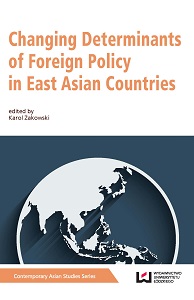Political Leadership and the Security Policy: Negotiations on the US Military Bases in Okinawa under the Murayama and Hashimoto Cabinets
Political Leadership and the Security Policy: Negotiations on the US Military Bases in Okinawa under the Murayama and Hashimoto Cabinets
Author(s): Beata Bochorodycz
Subject(s): Public Administration, Public Law, Economic policy, International relations/trade, Developing nations, Geopolitics
Published by: Wydawnictwo Uniwersytetu Łódzkiego
Keywords: Foreign and defense policy; Futenma; military bases; decision making; prime minister role
Summary/Abstract: The problem of the US military bases, including the relocation of the Futenma military air station and a construction of a Futenma replacement facility (FRF) in Okinawa, has been a difficult and contested issue in Japanese domestic and foreign affairs for decades. In November 1995 Prime Minister Murayama and Vice President Al Gore established a Special Action Committee on Okinawa for deliberation on the reduction and realignment of the military bases. In April 1996 President Clinton and PM Hashimoto decided on the relocation and construction of the FRF in the prefecture within five to seven years. As of 2015 the prospects for implementation seem dim, especially after the electoral victory of the anti–base governor Onaga Takeshi in November 2014. This article focuses on the decision–making process under two consecutive prime ministers, Murayama and Hashimoto, since it was during their premiership that the issue was set on the agenda and decided upon. The article argues that on one hand PM Murayama made several important decisions, but lacking enough experience and power as a minor coalition member, as well as due to short term in office, was not able to supervise implementation of his decisions. On the other hand, PM Hashimoto did exercise strong leadership in regard to Futenma Air Base, but as the LDP president his decisions run along the general policy of Ministry of Foreign Affairs, who is in charge of the foreign policy formation on daily base. Furthermore, the American side agreed to the relocation since the benefits – a new and technologically advanced facility for the US army, entirely paid by the Japanese government, outweighed the hardship of the transfer. In the entire process, the Okinawan community, demanding removal of the bases outside the prefecture, was not consulted and
hence the ongoing opposition to the US bases and FRF.
Book: Changing Determinants of Foreign Policy in East Asian Countries
- Page Range: 89-114
- Page Count: 26
- Publication Year: 2017
- Language: English
- Content File-PDF

